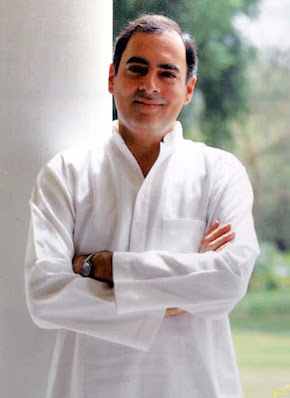'There are a Million ways to Success but only one way to Failure - Not Trying' - Kavitha Reddy
Friday, August 23, 2024
Thursday, August 22, 2024
Tuesday, August 20, 2024
Dynasty Politics; No more Legacy, it is Power
At 52 years of age, Priyanka Gandhi is not an MP candidate, works for the party as General Secretary. Rahul Gandhi is a 5-time MP, yet was not even a Minister during the 10 years of the UPA Government, he was General Secretary in charge of the Youth Congress, NSUI, later AICC President and worked for the party relentlessly.
Yet Rahul Gandhi is blamed for being the torch bearer of dynasty politics, history says that children entered electoral politics post-death of their parent, the same is true for the Nehru-Gandhi family, and many others including Sachin Pilot, Jyotiraditya Sindia, Naveen Patnaik, Jagan Reddy too.
Every resistance to the blatant dynasty politics within the congress party was projected as a voice against Gandhi's and silenced to the convenience of the senior leaders who then carefully plotted the easy entry of their relatives into electoral politics.
The dynast politics, which was to keep the family legacy alive is now turned into family politics, to keep all the power within the families and end the rise of any alternate leadership in the districts or in communities.
Recent Lok Shaba elections in Karnataka exposed the dangerous trends of family politics, it shocked many but exposed how powerful people systematically destroyed the rise of any other leadership within the districts. When questions were asked about family members getting Lok Sabha tickets, the only reply was that there were no better alternates on winnability criteria, but no one asked why the alternate leadership was not allowed to grow all these years.
Now in most districts the political families even for the next generation can dictate and manipulate who gets the tickets for local bodies and assembly elections based on their political convenience or the loyalty shown by the ticket aspirants.
This year as India celebrated the 80th birth anniversary of one of the brilliant minds, visionary, father of digital India and ex-Prime Minister Rajiv Gandhi, the congress men and women must ask themselves if they have done justice to his legacy and vision.
Rajiv Gandhi identified talented young men and women from all walks of life and within the party and gave them opportunities, he had a vision to make congress party more grassroot and more inclusive. He spoke for the women who are 50% of the population and wanted them to be the voice from panchayat to parliament.
The men who have been the direct beneficiaries of Rajiv Gandhi’s visionary politics are not only doing injustice to his legacy but are dismantling his inclusive vision of making political system accessible to ordinary people and are replacing it with rampant family politics. Also, the laziness of the power hungry to work in the grassroot has given rise to dabangs and money bags thereby creating chota short-cut to power without hard work, ideology, or merit.
History has always proven that natural justice will prevail, powerful will be challenged and eventually the system will go on a reset mode. Since politics is the engine of change, India always expects better from the oldest party that was built and is represented by masses.
Kavitha
Reddy
Thursday, August 1, 2024
See Sandur in September - Bapu
2024 marks one of the greatest moments in the Independence struggle, it marks the 100 years of the 39th Belgaum (now Belagavi) session of Indian National Congress under the Presidentship of Mahatma Gandhi, it was the only term Bapu was the President of All India Congress Committee (AICC).
The Belgaum session held on 26th & 27th December 1924 was significant for many reasons, it was the first time Indian National Congress session was held in a village, it importantly united all factions of the Indian National Congress. Bapu declared spinning the yarn as an activity of the independence movement and non-violence & non-co-operation as the only means to achieve political freedom.
The 1924 session venue was named as Vijayanagar, which today is Veerasoudha Udyana that has preserved several memories, photos, and statue of Mahatma Gandhi. A huge well was dug which was named Pampa Sarovar and was inaugurated by Bapu and other delegates making water available in excess to the village.
The stalwarts like Motilal Nehru, Sardar Vallabhai Patel, Jawaharlal Nehru, Lala Lajpat Rai, Rajagopalachari, Annie Besant, Sarojini Naidu, Chittaranjan Das, Madan Mohan Malalviya, Saifuddin Kichalu, Maulana Abul Kalam Azad, Maulana Shaukat Ali, Rajendra Prasad, and so many others were part of the 1924 AICC session.
Over 17000 delegates across the country and abroad attended the session, they paid Rs 1 as delegate fee, important to point out that Bapu had requested the in-charge secretary to reduce the delegate fee for Rs 10 to Rs 1.
Mahatma Gandhi has visited Karnataka (present) for over 18 times between 1915-1940, and visited Bengaluru, Tumakuru, Mysore, Hassan, Hubballi, Dharwad, Chitradurga, Channapatna, Maddur, Mandya, Belgaum, Kolar, Nandi Hills, Kengeri, Shivamogga, Sandur and few other places.
From public meeting to promoting Kadhi, conferences on ending untouchability, Mahatma Gandhi’s foot steps can be traced across Karnataka. In his rural upliftment programs, he often spoke about Swadeshi, Sarvodaya and Aparigraha which become the core principles of self-less services in the many princely states.
Bellari District has a special place in Bapu’s life story, in 1934 Bapu visited Sandur on invitation from the royal family, mesmerized by the post monsoon greenery, rocky hills and scenic beauty, he called to ‘See Sandur in September’. The tiny town in Kudligi houses the memorial holding the ashes of Bapu, and still remind people about the Gandhian way of life.
In the celebration of 100
year of the AICC session in Belgaum and celebrating Mahatma Gandhi as its
President will be incomplete if the foot prints of Bapu are not traced in every
part of Karnataka and recorded for the future generations.
Kavitha Reddy




